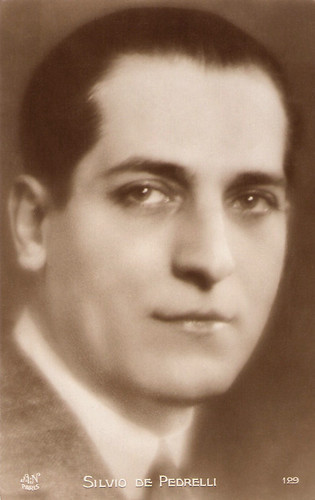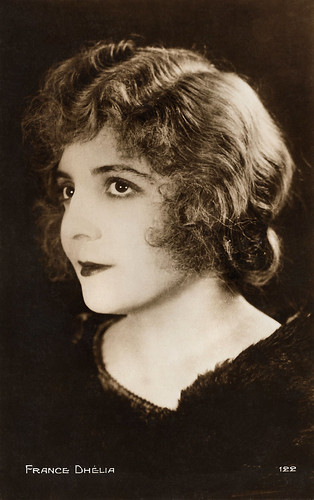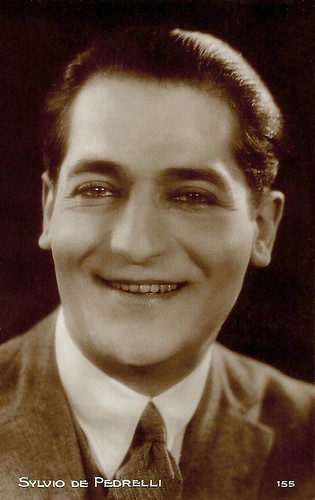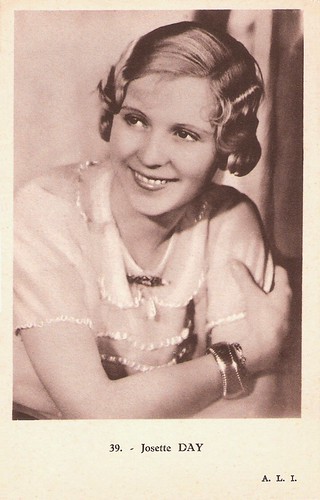Little known Sylvio de Pedrelli (?-?) had an extensive career in French silent cinema. Between 1918 and 1948, he appeared in nearly 30 films. He was often the third party in his films, and played several exotic and seducing foreigners.

French postcard by Cinémagazine-Edition, no. 129. Photo: A.N, Paris.
It is not known where Sylvio de Pedrelli, also written as Silvio de Pedrelli, was born, although we could presume he was of Hispanic or Portuguese origin.
In 1918 he debuted in film, perhaps in Âmes de fous/Madmen's souls (Germaine Dulac, 1919).
That year he also played the male lead as prince Mourad in the French orientalist fairy tale La sultane d'amour/The Sultan of Love (Charles Burguet, René Le Somptier, 1920). It starred France Dhélia as princess Delouah who disguises as a girl from the people while prince Mourad dresses as a fisherman. They meet, split and keep searching for each other, while the sinister sultan Malik pursues Delouah as well.
Pedrelli played also supporting parts in Ecce Homo (Abel Gance, 1919), and in La croisade/The Crusade (René Le Somptier, 1919). In 1920, Pedrelli played Tristan opposite Andrée Lionel as Isolde in Tristan et Yseult/Tristan and Isolde (Maurice Mariaud, 1920).
In addition to Le destin rouge/Red fate (Franz Toussaint, 1921), Pedrelli also played a supporting part in the Honoré de Balzac adaptation Le père Goriot/Father Goriot (Jacques de Baroncelli, 1921), starring Gabriel Signoret as the man who ruins himself for his spendthrift and ungrateful daughters.

France Dhélia. French postcard by Cinémagazine, no. 122.
Sylvio de Pedrelli appeared in Corsica (René Carrère, Vanina Casalonga, 1923) starring Lily Damita, and the short Les cinquante ans de Don Juan/Fifty years of Don Juan (Henri Étiévant, 1924). Then he played the charming seducer Girard in the Albatros production La dame masquée/The masked lady (Viktor Tourjansky, 1924), killed by the protagonist Hélène Tessière (Nathalie Kovanko).
After La Nuit de la revanche/The Night of the revenge (1924) with Charles Vanel and Grand-mère/Grandmother (Albert-Francis Bertoni, 1925), Pedrelli played a suave Italian count who tries to seduce the American Dolly (Dolly Davis) in another Albatros production, the comedy Paris en cinq jours/Paris in five days (Nicolas Rimsky, Pierre Colombier, 1925).
He played a lead in L’avocat/The lawyer (Gaston Ravel, 1925) about a lawyer who must defend his beloved who is charged with the murder of her husband. Next, Pedrelli had a supporting role in Le juif errant/The Wandering Jew (Luitz-Morat, 1926), and Le berceau de Dieu/The Craddle of God (Fred LeRoy Granville, 1926), and a leading role in L’épervier/The Sparrow Hawk (Robert Boudrioz, 1926).
Pedrelli played in the German adaptation of a French boulevard comedy, Fräulein Josette, meine Frau/Miss Josette, My Wife (Gaston Ravel, 1926), with Dolly Davis, Livio Pavanelli, Agnes Esterhazy, André Roanne and Adolphe Engers. Davis marries her tutor because of an inheritance, Pedrelli is an Argentinian suitor.
In 1927-1928 Pedrelli performed in the title role of La Maison du Maltais/Karina the Dancer (Henri Fescourt, 1928), a drama about an ex-prostitute (Tina Meller) who has married but then meets the father of her child, Matteo the Maltese. He sacrifices himself for her.
This was followed by another comedy with Dolly Davis and André Roanne, La merveilleuse journée/The wonderful day (René Barberis, 1928) and the dramatic thriller La venenosa/Poison Girl (1928) starring Warwick Ward and Raquel Meller. A daring circus girl has affairs with various men, but most men die, hence the ‘poison girl’. Eventually she marries an Indian prince (Pedrelli), but when he is killed by a jealous lover, she inherits his fortune and marries her true love, a criminal (Ward). In these films, Pedrelli was often the third party and played many exotic and seducing foreigners.

French postcard by Editions Cinémagazine, no. 155.
In the early 1930s, when sound film had set in, Sylvio de Pedrelli played in a few Franco-German coproductions, shot in Germany. First came La folle aventure/The crazy adventure (Carl Froehlich, André-Paul Antoine, 1930), costarring Jean Murat, Marie Glory and Marie Bell. Then followed L’inconstante. Je sors et tu restes là/The fickle - I go out and you stay there (Hans Behrendt, André Rigaud, 1931).
He had a small part in the French version of The Testament of Dr. Mabuse: Le testament du Dr. Mabuse (Fritz Lang, René Sti, 1931), produced by Seymour Nebenzahl and with Rudolf Klein-Rogge as the evil hypnotist.
Pedrelli also had a part in the early sound comedy Amour… amour…/Love... Love... (Robert Bibal, 1932), as the crook with whom the leading character (Colette Broïdo) is in love.
After a gap of some six years, Pedrelli reappeared on screen as an Arab governor in Les hommes nouveaux/The New Men (1936), about colonials making career in Morocco. In 1938 Pedrelli had a part as, again, an Oriental in the Fernandel comedy Tricoche et Cacolet/Tricoche and Cacolet (Pierre Colombier, 1938), and he played Concini, assassinated in the beginning of Sacha Guitry’s historic tale Remontons les Champs-Elysées/Let us go back up the Champs-Elysées (1938, Sacha Guitry).
Finally, Pedrelli did his last film part as judge Roncolli in Marcel L’Herbier’s La revoltée/Stolen Affections (Marcel L’Herbier, 1948), the story of a calvary of a woman (Josette Day) who witnesses the adultery of her husband and the death of her child. When the man wants her back she pushes him back, causing him to commit suicide. A new lover proves to be married already, so she has nothing to live for anymore.
There is no information on the web about Sylvio de Pedrelli after he appeared in this film. We couldn't find the date nor the place of his death.

Josette Day. French (?) postcard by A.L.I., no. 39.
Sources: Filmportal.de, DVDtoile (French), and IMDb.

French postcard by Cinémagazine-Edition, no. 129. Photo: A.N, Paris.
French Orientalist Fairy Tale
It is not known where Sylvio de Pedrelli, also written as Silvio de Pedrelli, was born, although we could presume he was of Hispanic or Portuguese origin.
In 1918 he debuted in film, perhaps in Âmes de fous/Madmen's souls (Germaine Dulac, 1919).
That year he also played the male lead as prince Mourad in the French orientalist fairy tale La sultane d'amour/The Sultan of Love (Charles Burguet, René Le Somptier, 1920). It starred France Dhélia as princess Delouah who disguises as a girl from the people while prince Mourad dresses as a fisherman. They meet, split and keep searching for each other, while the sinister sultan Malik pursues Delouah as well.
Pedrelli played also supporting parts in Ecce Homo (Abel Gance, 1919), and in La croisade/The Crusade (René Le Somptier, 1919). In 1920, Pedrelli played Tristan opposite Andrée Lionel as Isolde in Tristan et Yseult/Tristan and Isolde (Maurice Mariaud, 1920).
In addition to Le destin rouge/Red fate (Franz Toussaint, 1921), Pedrelli also played a supporting part in the Honoré de Balzac adaptation Le père Goriot/Father Goriot (Jacques de Baroncelli, 1921), starring Gabriel Signoret as the man who ruins himself for his spendthrift and ungrateful daughters.

France Dhélia. French postcard by Cinémagazine, no. 122.
Third Party
Sylvio de Pedrelli appeared in Corsica (René Carrère, Vanina Casalonga, 1923) starring Lily Damita, and the short Les cinquante ans de Don Juan/Fifty years of Don Juan (Henri Étiévant, 1924). Then he played the charming seducer Girard in the Albatros production La dame masquée/The masked lady (Viktor Tourjansky, 1924), killed by the protagonist Hélène Tessière (Nathalie Kovanko).
After La Nuit de la revanche/The Night of the revenge (1924) with Charles Vanel and Grand-mère/Grandmother (Albert-Francis Bertoni, 1925), Pedrelli played a suave Italian count who tries to seduce the American Dolly (Dolly Davis) in another Albatros production, the comedy Paris en cinq jours/Paris in five days (Nicolas Rimsky, Pierre Colombier, 1925).
He played a lead in L’avocat/The lawyer (Gaston Ravel, 1925) about a lawyer who must defend his beloved who is charged with the murder of her husband. Next, Pedrelli had a supporting role in Le juif errant/The Wandering Jew (Luitz-Morat, 1926), and Le berceau de Dieu/The Craddle of God (Fred LeRoy Granville, 1926), and a leading role in L’épervier/The Sparrow Hawk (Robert Boudrioz, 1926).
Pedrelli played in the German adaptation of a French boulevard comedy, Fräulein Josette, meine Frau/Miss Josette, My Wife (Gaston Ravel, 1926), with Dolly Davis, Livio Pavanelli, Agnes Esterhazy, André Roanne and Adolphe Engers. Davis marries her tutor because of an inheritance, Pedrelli is an Argentinian suitor.
In 1927-1928 Pedrelli performed in the title role of La Maison du Maltais/Karina the Dancer (Henri Fescourt, 1928), a drama about an ex-prostitute (Tina Meller) who has married but then meets the father of her child, Matteo the Maltese. He sacrifices himself for her.
This was followed by another comedy with Dolly Davis and André Roanne, La merveilleuse journée/The wonderful day (René Barberis, 1928) and the dramatic thriller La venenosa/Poison Girl (1928) starring Warwick Ward and Raquel Meller. A daring circus girl has affairs with various men, but most men die, hence the ‘poison girl’. Eventually she marries an Indian prince (Pedrelli), but when he is killed by a jealous lover, she inherits his fortune and marries her true love, a criminal (Ward). In these films, Pedrelli was often the third party and played many exotic and seducing foreigners.

French postcard by Editions Cinémagazine, no. 155.
No Date Nor Place of Death
In the early 1930s, when sound film had set in, Sylvio de Pedrelli played in a few Franco-German coproductions, shot in Germany. First came La folle aventure/The crazy adventure (Carl Froehlich, André-Paul Antoine, 1930), costarring Jean Murat, Marie Glory and Marie Bell. Then followed L’inconstante. Je sors et tu restes là/The fickle - I go out and you stay there (Hans Behrendt, André Rigaud, 1931).
He had a small part in the French version of The Testament of Dr. Mabuse: Le testament du Dr. Mabuse (Fritz Lang, René Sti, 1931), produced by Seymour Nebenzahl and with Rudolf Klein-Rogge as the evil hypnotist.
Pedrelli also had a part in the early sound comedy Amour… amour…/Love... Love... (Robert Bibal, 1932), as the crook with whom the leading character (Colette Broïdo) is in love.
After a gap of some six years, Pedrelli reappeared on screen as an Arab governor in Les hommes nouveaux/The New Men (1936), about colonials making career in Morocco. In 1938 Pedrelli had a part as, again, an Oriental in the Fernandel comedy Tricoche et Cacolet/Tricoche and Cacolet (Pierre Colombier, 1938), and he played Concini, assassinated in the beginning of Sacha Guitry’s historic tale Remontons les Champs-Elysées/Let us go back up the Champs-Elysées (1938, Sacha Guitry).
Finally, Pedrelli did his last film part as judge Roncolli in Marcel L’Herbier’s La revoltée/Stolen Affections (Marcel L’Herbier, 1948), the story of a calvary of a woman (Josette Day) who witnesses the adultery of her husband and the death of her child. When the man wants her back she pushes him back, causing him to commit suicide. A new lover proves to be married already, so she has nothing to live for anymore.
There is no information on the web about Sylvio de Pedrelli after he appeared in this film. We couldn't find the date nor the place of his death.

Josette Day. French (?) postcard by A.L.I., no. 39.
Sources: Filmportal.de, DVDtoile (French), and IMDb.
No comments:
Post a Comment